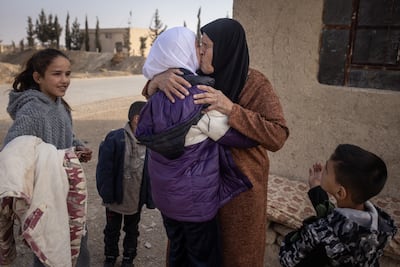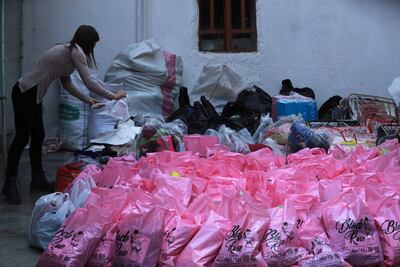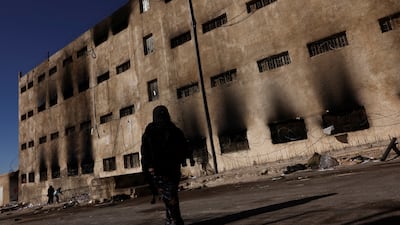I wonder how Fatima is doing.
I first met the 50-year-old Syrian grandmother in her ramshackle refugee shelter in Lebanon’s Bekaa Valley. She lived with the seven grandchildren she had bravely extracted under the nose of the Assad government, when their parents were killed or disappeared.
I thought of her again this year, watching reports of Israeli bombs falling in Bekaa. Hoping that she had remained safe, I wonder if she is now stuck in the traffic jam of returning refugees. Or if back in Damascus, is she scouring the notorious Sednaya prison for loved ones?
Fatima’s determination to return was always clear. And she never demanded humanitarian help. Her ambition was set higher as she urged me to persuade her oldest grandson to become an engineer because “we need many to rebuild our country”.
Fatima personifies the aid dilemma around helping Syrians survive, stabilise and prosper. The political and security uncertainties around Syria’s future are being intensely debated. So should the well-being of its people as that bears directly on the new state’s viability.
How will Syrians live, eat, keep healthy, stay warm, repair and power their homes and communities, school their children, get to work, earn enough for daily necessities, and guard precious new freedoms, while mourning their losses, controlling their anger and seeking justice for myriad wrongs?

Their needs are obvious. After 13 years of civil war, 8 million people of Syria’s estimated 24 million population are internally displaced and 6.3 million are refugees. Around 500,000 have died and 160,000 were detained, with many tortured and disappeared.
Ninety per cent of Syrians fell below the poverty line and life expectancy dropped by 10-15 years as towns were reduced to rubble, healthcare, education, water, sanitation, energy, agriculture and transport collapsed, public administration corrupted, and diseases proliferated.
Syria’s cumulative damage and loss – exacerbated by international sanctions, Covid-19 and a 2023 earthquake – amount to four-fold its pre-conflict GDP while its overall economy has shrunk 85 per cent.
How will Syria rise again? We know from other post-crisis experiences that everything must be addressed simultaneously. That is because everyone hurts in their own way and if differing needs are not recognised, disappointment turns into disgruntlement. Realising the inclusive new Syria requires something – however small – for everyone.

That is contrary to usual post-conflict aid, which is sequential, starting with humanitarian relief followed by rehabilitation and transitional recovery, before getting to development. That journey lasts decades, entails millions of dollars lost through inefficiency and corruption, and creates debilitating aid dependency.
Along the way, donors impose difficult political conditions such as democratic governance, human rights, or free markets. Afghanistan, Iraq, and Haiti illustrate how easy it is to lose the peace.
Can Syria be different? Having overthrown their oppressors, they have earned the right to set their own direction. But will they be allowed to do so? The risk is from outsiders who have long meddled in their affairs – usually for the worse.
To start with refugees, of which Syria has the most in the world. The new rulers have invited them to return. The excellent open-door policy is somewhat dampened by calls for caution by international agencies because their customers-in-exile face difficulties from destroyed infrastructure and livelihoods.
Humanitarians must not undermine the right-to-return nor underestimate returnee capacities to create their own solutions. They must recognise the stabilisation benefit of social capital built through a recovery shared between those who fled, and the majority who stayed to endure the worst.
The economic contribution of returnees through repairing and re-starting enterprises is potentially greater than available foreign aid. Besides, the best way to build an inclusive state is to get expatriate Syrians to help shape it – right from the beginning.
Meanwhile, as refugees outlive their initial welcome, countries hosting Syrians – biggest being Turkey, Lebanon, Germany, and Jordan – are revising their asylum policies. But they would gain more if temporary protection is not withdrawn hastily. Early returnees could first test the waters before taking their families back. That also gives host countries time to adjust to the loss of refugee contributions. This is especially important to European economies.
Based on other situations, the likely outcome is that about a third of Syrian refugees will return soon, a third will trickle back over coming years, and a third will permanently settle abroad. The latter will be useful sources of future investment in Syria and for asserting Syrian influence within host countries.
The Syrian diaspora is already a significant provider of humanitarian relief with numerous NGOs created by exiles – 700 in Turkey alone with scores more among Arab neighbours, Europe and North America.
Notable is that supporters prefer Syrian networks to help their kin, because they mistrust the internationally-dominant NGOs, who have limited access or made unprincipled compromises with the previous regime.
Some UN aid agencies are similarly tarnished. Those who operated out of Damascus are seen as too close to the previous authorities. Others were obliged to rely on haphazard cross-border access from Turkey, especially into Kurdish-held areas.
The Red Cross Red Crescent system also struggled. ICRC suffered cross-line access constraints and could not freely access the Assad government's prisons and torture centres – or speak about them. Division of labour and fundraising tensions with its sister agency, The International Federation of Red Cross, also compromised delivery.
The Syrian Red Crescent, supposedly working to humanitarian principles of neutrality and impartiality, was contentious. It was necessarily close to the Assad government to do what it could in government-ruled areas only, and the state misused it as a gatekeeper or to block other agencies.
It is unsurprising that the Assad government co-opted the aid system. Re-setting that is a pre-requisite for channelling expanded assistance. Donors have a duty to ensure that the new Syria has renewed fit-for-purpose delivery partners. That requires critical scrutiny of all agencies and in-country reforms to replace compromised senior staff and devise new operating modalities.
Meanwhile, financing arguments intensify. Humanitarians plead for immediate millions in competing life-saving sectors. The limited influence of the UN Office for the Co-ordination of Humanitarian Affairs (OCHA) over powerful operational UN agencies means that it cannot settle priorities and settles for collating apples and pears. The latest UN Syria appeal asks for $4.1 billion of which two-thirds is not yet met. The appeal requirement will undoubtedly increase during 2025.
The Red Cross Red Crescent has its own appeals as do big NGOs. Small aid and private sector flows can only be guessed at. With a plethora of funds and channels, there is a fog around resource flows. Traditionally, the US, EU and UK are the largest contributors but their foreign aid is increasingly deployed domestically on aiding refugees. The generosity of rich Arab nations is not necessarily reflected fully in global statistics.
The new Syrian authorities may not be bemused by the lack of international transparency. This will not be conducive to build trust nor to allay concerns over renewed corruption.
Nevertheless, the humanitarian millions pale into insignificance compared to the $400 billion initial estimate for reconstruction. Meanwhile, emergency fiscal support is needed to shore up a fast depreciating Syrian currency. Without correction, hyperinflation will erode the value of foreign remittances and aid, deepen poverty and exacerbate the humanitarian crisis.
To throw into the mix is Syria’s external debt. Officially, this is only $5 billion but reportedly, more than $30 billion is owed to Iran and comparable amounts to Russia. With few independent records, and loans possibly misused as sanctions-busting devices, the new Syria should not be held accountable for toxic debts.
Could Syria retrieve Mr Assad’s stolen billions? His family allegedly controlled $16 billion in assets, with some estimates reaching $100 billion. Tracking and repatriating them will take years but is worth pursuing. Proceeds will be handy for national development and to compensate the families that suffered the government's worst abuses.
It is highly feasible for Syria to get back on its feet, starting with lifting economic and trading sanctions, and the terrorist designations of key actors at the opportune political moment. Beyond that, the natural attributes of the Syrian people hitched to Syrian enterprise will do much of the heavy lifting towards recovery.
The rest of us could help or hinder. A serious concern relates to the fragmented international aid system – with its humanitarian, development, and financing divides, agency rivalries and competitive donor interests.
Could our world rise above this to truly help Syria?



